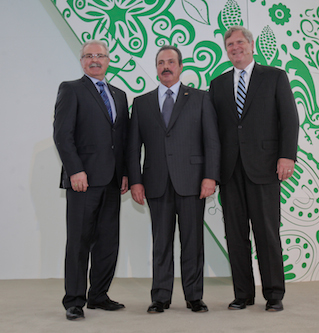Canada’s Ag minister Gerry Ritz met in Mexico, with two of his counterparts, Mexican agriculture secretary Enrique Martínez, and U.S. agriculture secretary Tom Vilsack, gathering together for the first time.
The meeting marked the North American Free Trade Agreement, (NAFTA) 20th anniversary where the three discussed the vast benefits the Agreement has  created for the North American agriculture industry at a panel discussion with the three agriculture leaders.
created for the North American agriculture industry at a panel discussion with the three agriculture leaders.
 created for the North American agriculture industry at a panel discussion with the three agriculture leaders.
created for the North American agriculture industry at a panel discussion with the three agriculture leaders.During the NAFTA panel, Ritz stressed the importance of fair and science-based decisions to facilitate trade within the NAFTA region. He later reinforced the same message during bilateral discussions with Vilsack and Martínez.
During his meeting with the U.S. secretary, Ritz raised various issues of interest to Canada, including the importance of the U.S. ending the discrimination against Canadian cattle and hogs under mandatory Country of Origin Labeling (COOL). He turned his hat, while agreeing on pigs, what about beef animals. Ritz stressed to secretary Martínez of Mexico, the need for a resolution of market access for Canadian beef from animals over thirty months in accordance with science-based rules.
“The signing of NAFTA 20 years ago has led to a more competitive and integrated North American agriculture industry,” says Ritz. “This visit to Mexico provided a unique opportunity for myself, Vilsack and Martínez to come together to reaffirm our commitment to promoting a fair, open, and integrated North American market that will continue to keep our industries strong.”
Ritz says despite the negative impacts and growing opposition within the United States, the U.S. government appears prepared to defend M-COOL to the end.
During a conference call, Ritz told reporters nothing new came out of the discussion.
“I did get the feeling that they are coming to grips with the fact that this one is slipping away from them but of course it’s never over till it’s over,” he says. “Having said that I think there is a growing recognition that this is harming the U.S. industry far more than it would ever be any help to American consumers. Well over 100 Senators and Congressmen in the end signed on to the industry judicial challenge.”
Ritz says that’s unprecedented and thinks a lot of that came about because of the pressure.
“… And we heard that positively from American industry the pressure with our comprehensive politically incorrect retaliatory list certainly brought a lot of people out of the woodwork, got them educated on the issue and they came forward with support for moving away from M-COOL.”
The Ag minister says two major plants closed in the U.S. because they couldn’t get the volumes of beef needed to remain viable and two more are on shaky ground.
“That’s very concerning to Canadian producers because we rely, some 70 per cent of our processing capacity is American so as these plants close it gives us less opportunity to make use of that,” he said.
Ritz acknowledges he would like to think there is opportunity for a reversal of the U.S. position on M-COOL but the administration appears mired down to the point where they’ll ride this to the bottom which is unfortunate because it’s American jobs and the economies of the livestock sectors in all three countries that are at risk. •
— By Harry Siemens





